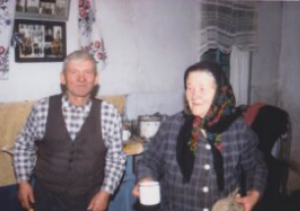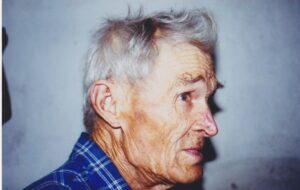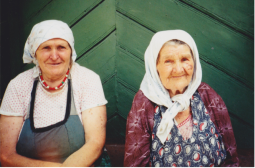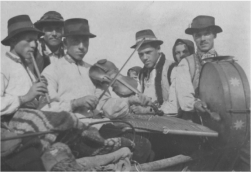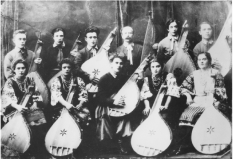—What is your date of birth?
Mykhailo Ievdokymovych: 1902.
—Where were you born?
Mykhailo Ievdokymovych: In Krut’ky.
—What was this district called at the time?
Mykhailo Ievdokymovych: Irkliivs’kyi and prior to that it was called Zolotonoshens’kyi district of Poltava oblast’.
—Did you have a large family?
Mykhailo Ievdokymovych: Yes. I was the only one who was literate. We had three years of schooling at the time.
—How many children did your parents have?
Mykhailo Ievdokymovych: I have to count: [TN: sisters] Natalka, Hanna, Iivha, Motria, and Sekleta who died. All of them were illiterate.
—Did your father own land?
Mykhailo Ievdokymovych: Yes, but not a lot: about a hectare and about 0.7 hectares in the steppes.
—Did he have any cattle?
Mykhailo Ievdokymovych: A horse and a cow.
—Any pigs?
Mykhailo Ievdokymovych: Yes, one—to breed piglets.
—What about bees?
Mykhailo Ievdokymovych: No. We had little land, so my father would work for other people harvesting crops. He would reap the crops and get every sixth or seventh sheaf in return for his work, depending on the owner’s rules.
—Did he help harvest the crops in his village?
Mykhailo Ievdokymovych: In his village or in Krasne; it was called Pans’ke at the time. Their land was behind our land, near Chornobai. He had a barn and a well there.
—Was this at your father’s or at the khaziain’s?
Mykhailo Ievdokymovych: At the khaziain’s. We would go there when I was six or seven; they had a steam-powered thresher, and my father helped with threshing and sowing.
—Did he sow by hand?
Mykhailo Ievdokymovych: No, he had a seeding machine.
—What was the name of the khaziain?
Mykhailo Ievdokymovych: Vasyl’ Petrovych Klymenko.
—Did you and your mother help your father?
Mykhailo Ievdokymovych: Of course. During the harvest, my mother and father both worked there, and I was helping around with the rake.
—What about your sisters?
Mykhailo Ievdokymovych: My sisters worked for the Germans, where the Germans lived on our territory.
—Were did the Germans live?
Mykhailo Ievdokymovych: There was a colony that was in the process of returning to their land, not far from Cherkasy, on the right bank.
—Was this before WWI?
Mykhailo Ievdokymovych: Yes. Each spring, my sisters would go to work for this German and would work there until Saint Simeon Stylites [TN: September 14] or the Intercession of the Theotokos [TN: October 14], sometimes until Saints Cosmas and Damian [TN: November 14], and then they would come home having earned some money as they had agreed with the landowner.
—How much did he pay?
Mykhailo Ievdokymovych: About 40 rubli.
—Would that be enough for clothes?
Mykhailo Ievdokymovych: Yes, girls would come and make clothes for themselves with that. We had Jews in the village who owned a store; they knew when the girls came home, so they would follow them right away and come to borrow money. He knew that if they came home, it was time to make clothes. He’d make a skirt or a coat for them, and then they would sit at home embroidering or weaving.
—Did they buy the clothes from that Jewish man?
Mykhailo Ievdokymovych: He used to go to Lodz and Warsaw and bring the goods from there—plentry of goods. He built a large store and would bring his cart there, load the goods, and take them to the market in Irkliiv to sell.
—Were there any Poles?
Mykhailo Ievdokymovych: I can’t say for sure.
—What word did people use in your village: Jews or zhydy?
Mykhailo Ievdokymovych: Jews. “Zhydy” was ridicule.
—Who was in charge of your family: father or mother?
Mykhailo Ievdokymovych: Both were in charge of the homestead.
—Who was in charge of the money?
Mykhailo Ievdokymovych: You didn’t have any money saved at the time; one had to buy this or that.
—How did you survive the famine?
Mykhailo Ievdokymovych: It was hard. It’s hard even to think about it. We ate millet chaff. We used to grind proso millet and corn cobs in the kolhosp.
—Did you have a cooperative in the village?
Mykhailo Ievdokymovych: There was one in Mel’nyky, and people from our village joined it.
—Who joined it: the richer ones or the poorer?
Mykhailo Ievdokymovych: They were not so poor. The people [in Mel’nyky] were better off, so the people from our village went there.
—Was life more bearable in Mel’nyky?
Mykhailo Ievdokymovych: You could say so. We had to go to a far-away field to collect the spikelets, and they had the steppe close by, all around them. They were given food there. Then they saw that it was not working out, so they left [the cooperative].
—Do you remember where your parents used to go to the fair?
Mykhailo Ievdokymovych: There was a fair in Irkliiv.
—Did your parents sell anything at this fair?
Mykhailo Ievdokymovych: They would buy and sell, including the cattle. People would come here from Moscow to buy the production animals for meat. We had large oxen here, good for plowing, weighing about eight quintals each.
—Do you remember the famine in 1921?
Mykhailo Ievdokymovych: Yes, I do.
—Why did it happen?
Mykhailo Ievdokymovych: The harvest was bad, and some people didn’t make it. We had 0.75 hectares in the steppes, and my father kept one bag of grain for sowing. Life was hard, but he sowed the wheat and the harvest was good.
—Was this what saved you that year?
Mykhailo Ievdokymovych: Some people died, but not many.
—When did the kolhospy begin in your village?
Mykhailo Ievdokymovych: They fooled us. They used to give people land.
—When did they give land?
Mykhailo Ievdokymovych: In 1917 when the Revolution began. They started to distribute land among people at the time, and the people took it and plowed it. The state did not charge any tax; you kept whatever you reaped. If you had anything extra, a representative of the government came to the market, spread a large sheet of tarpauline, and people who had a surplus of bread would bring it there. One brought this, the other brought that; the market would last about three days. Once they collected everything, they would weigh the produce and pay the people money. Then they would arrange to transport the produce to the station in Zolotonosha where it was sold. My father had a horse, so they would tell him to come on such and such day to transport the goods.
—When did the kolhospy start in your village?
Mykhailo Ievdokymovych: In 1928. They were called SOZ [Spil’niy obrobitok zemli, an early form of collectivization; mostly the 1920s]. They used to say at the time that the land was given to us for nine years; we worked and wondered what would happen if the land were taken away from us. Then in 1929, they say, “Come on, guys, sign here.” People didn’t know what they were signing up for; the poorest ones started signing up—those who didn’t even use to plow the land. Then the collective farms started taking away the people’s cattle and work tools, confiscating people’s land, and giving them low-quality land in the lower parts of the field where plots were smaller and less fertile.
—Did your father join the kolhosp right away?
Mykhailo Ievdokymovych: No, he was no longer alive at the time.
—How did you join the kolhosp?
Mykhailo Ievdokymovych: I didn’t want to join for a long time because I had three or four small children. They said, “Sign up because you won’t survive otherwise.” I said, “I have a large family, but there are no workers.” So, they dragged this on for some time and gave me the worst land. I sowed proso millet on that land and took my children with me to help me weed the land. The government representatives came, “Whose millet is this? Son of a bitch! We gave him the bad land, and he has such a good harvest.” They started looking for ways to make me join the kolhosp. Then they took my cow. I went around asking to have it back, but they didn’t give it back until I promised to join the kolhosp. The harvesting time came, and the people who sowed their own fields were ordered to work in the kolhosp and not touch anything on their own land. Old man Savka joined right before I did, went to his land plot, and collected the spikelets there to eat. They found out and came to his house to take it away. I didn’t give them anything; I kept my grain and my children.
—Did they take your land away from you?
Mykhailo Ievdokymovych: The hardworking people stayed, but later on they had to run to the kolhosp because otherwise they would have no land, nothing.
—Were some people exiled?
Mykhailo Ievdokymovych: Yes.
—Why were they exiled?
Mykhailo Ievdokymovych: Because they had money. The man worked hard. There was one man named Il’kovych; they took him away into the steppes. It was hard to stay on your own land at the time.
—After you joined the kolhosp, how did you make a living?
Mykhailo Ievdokymovych: We had a cow and went to the market. We never drank the milk from our cow, God forbid; we only took it to the market to sell. The state also imposed the taxes that we had to pay by giving them milk. We were just giving it away to them for nothing.
—How much were you paid when you worked in the kolhosp?
Mykhailo Ievdokymovych: They didn’t pay us and took everything away for the loans. When I worked in the Dnipro Hydroelectric Station, three or four men would come to impose the loan: you owe us this much, sign here, and pay back later. What would I pay it with? It was a hard time. If you went to the woods and stole some wood, they’d fine you. They would cut the wood and transport it on a two-wheel cart as far as Chornobaii.
Ol’ha Mykhailivna: I took wood to sell on the market in Chornobaii. I stood there a long time until one woman said, “I’ll pay you if you take the wood to my house.” So, I did, and she gave me two glasses of beans and 10 potatoes. She also invited me to have breakfast with her. I sat down, and she gave me a large plate of soup; the little Romani children flocked around me right away, so I put the spoon down and left.
Mykhailo Ievdokymovych: There were many Romani people. They would party in spring; they had good horses and a good caravan. The Romani women would run around the village fooling people; they’d get anything they wanted from people and then have a wedding party. They moved from village to village.
—Who organized the kolhosp: the locals from your village?
Mykhailo Ievdokymovych: Both the locals and the newcomers.
—How did they treat people?
Mykhailo Ievdokymovych: There were various people among them.
Ol’ha Mykhailivna: If you went to gather the spikelets, they’d go after you. One woman was beaten to death. The man who beat her is still alive; he was the head of the kolhosp and was paid a special pension.
—Did people steal anything from the kolhosp?
Mykhailo Ievdokymovych: No, they would search and check. If someone put a potato in their pocket, they would check, summon that person, and fine them.
—What were the authorities like in the village before the kolhosp? Who was in charge?
Mykhailo Ievdokymovych: A khaziaiin was in charge. A man was assigned to the village council for one or two years.
—What was this position called?
Mykhailo Ievdokymovych: A starosta.
—Was he elected by the people or assigned by the government?
Mykhailo Ievdokymovych: He was elected. He had to be a khaziaiin, not someone lazy.
—What was the election like?
Mykhailo Ievdokymovych: A skhodka.
—Were skhodky only held during the chairman election or at some other time as well?
Mykhailo Ievdokymovych: It was a village assembly. They would rent the communal land so the village council could have money.
—How often were the skhodky held?
Mykhailo Ievdokymovych: They would be announced as needed, and people would come.
—Was there a priest in the village?
Mykhailo Ievdokimovych: Yes.
—What was his name?
Mykhailo Ievdokimovych: Gryts’ko Shakhnovs’kyi. Back then the village was under the priest’s authority.
—Did he have a lot of authority?
Mykhailo Ievdokimovych: The highest authority: he baptized people and had the metrics. If anyone needed a passport, they would go to the priest.
—Would the priest always name the child?
Mykhailo Ievdokimovych: Yes, he would record the birth in the registrar; then he would report to the regional administration on how many were born and how many died.
—Did the priest own land?
Mykhaĭlo Ievdokimovych: He had land and a lot of cattle.
—Who worked for him?
Mykhailo Ievdokimovych: He didn’t work himself. Back in the times of Zolotonosha, he married a woman whose dowry was either 90 or 100 hectares. He had a khutir there which he rented out. He was probably paid in gold.
—Did he have land in the village?
Mykhailo Ievdokimovych: Yes.
—Who worked on this land?
Mykhailo Ievdokimovych: Day laborers.
—Do you know how much he paid them?
Mykhailo Ievdokimovych: I don’t know for sure, but they worked almost for free. He had many cows. He was rich.
—Was he kind to people?
Mykhailo Ievdokimovych: Oh, no! Not good. He would take God knows how much bread from memorial services—he did many of them—and would send it home, and the eggs kept coming all the time. He’d dump them in the ravine, and they’d rot and reek there.
—Did his wife do something in the church, too?
Mykhailo Ievdokimovych: No, she was farming at home.
—How did she treat people?
Mykhailo Ievdokimovych: She was a housewife.
—Did he have any horses?
Mykhailo Ievdokimovych: Yes, he had a cart. There was also a cart in the kolhosp; it belonged to the one who used to beat people; he’s still alive. He did such atrocious things to his people, beating them so hard for taking spikelets.
—Was this in the 1930s?
Mykhailo Ievdokimovych: Yes.
—Does the priest have any children?
Mykhailo Ievdokymovych: He has one son who has a disability in one leg. The priest’s sons were revolutionaries. In the Soviet time, he would sing Ukrainian songs and play the fiddle very nicely; one son was exiled.
—In 1937?
Mykhailo Ievdokymovych: No, before. One was named Zhorzh, and the exiled one was Mykola. He sang revolutionary songs, so the Communists came for him.
—Was the present-day head of the kolhosp its administrator at the time, too?
Mykhailo Ievdokimovych: They were the party members. People worked in the field and sheaved crops. They were persecuted a great deal. One man had a small basket and put spikelets into it. His peer helped him out a bit. I was in the steppes near the well, giving water to a herd of horses, when I saw several drunken people in the priest’s road cart going toward the haystacks. The man who gathered the spikelets had already been warned, and he was on his way. They asked, “Where is such and such?” “He’s not here.” That man was running away, but their horses caught up with him and they gave him a brutal beating. Then they threw him into the cart; I saw him there. One man went to take a look at what they did to him: they took him to a dugout in the steppe and left him under the hangar where the kitchen was. I went to take a look at him after work, and he was still there, not saying a word. I got so scared. Sons of bitches, they gave a hardworking man such a bad beating. In the evening, he got up and went home little by little.
—When the kolhospy began, were the churches closed down?
Mykhailo Ievdokymovych: The Germans did not burn the church, but the locals set up grain storage there.
—When was the grain storage set up—before the war or after?
Mykhailo Ievdokymovych: Before the war. When the Germans came, the church was still there; after the war they started restoring the church, hired workers, and brought back the service. The priests would change. Our priest from Zolotonosha was thrown out before the war; he died of hunger; he was a beggar.
—When was the church restored?
Mykhailo Ievdokymovych: After the war. In the 1960s the service was done in the houses. The priests would come and stay for three months or so.
—Did the authorities protest?
Mykhailo Ievdokymovych: No.
—What were the voices called in your village?
Mykhailo Ievdokymovych: It depended on the song: tenor, descant, and alto.
—Was there a lead woman singer on your street?
Mykhailo Ievdokymovych: A descant.
—Were there any neighborhoods in your village?
Mykhailo Ievdokymovych: The neighborhoods were nice: Chypachivka, Dibrova, and Selo. In some of them, as soon as the evening came, the girls would come out to sing and they would sign until God knows when. The same goes for the boys.
—Did you have vechornytsi or dosvitky?
Mykhailo Ievdokymovych: We had dosvitky. There were some houses where girls would come to weave and sew, and the guys would party.
—Did they play any games?
Mykhailo Ievdokymovych: They would either play cards or tell stories.
—At what age did the boys start going to dosvitky?
Mykhailo Ievdokymovych: Around 18. One had to go through a ritual and treat others to a drink to be accepted as a parubok [TN: a young man].
—Would you sometimes bring a bottle of alcohol?
Mykhailo Ievdokymovych: No.
—If a guy brought a bottle, would they drink it inside or outside?
Mykhailo Ievdokymovych: There were some houses where people had a drink.
—Did they only have a drink, or did they do something else? Did they hire the musicians?
Mykhailo Ievdokymovych: There was music. The guys used to party with the music.
—Who paid the musicians?
Mykhailo Ievdokymovych: No one. If someone had a wedding, they would hire the musicians.
—Did the guys bring musicians to dosvitky?
Mykhailo Ievdokymovych: No, not to the party. The party had its own musician. I forgot to tell you that the guys had work. A contractor would come to the village when the road was being built; he had 5–10 horses and would write down the name of those who would work for him in the spring. These guys would list their names, and he would come for them in the spring and give them the advance payment: as much money as each needed because they would be leaving their parents. Then he would give them the departure date. They would leave, do the work until the date they were paid, come back home, buy what they needed, and play all winter long.
—When your father died, who was in charge of your homestead?
Mykhailo Ievdokymovych: I was because my mother died, too.
—When girls were getting married, did you have to give them the dowry?
Mykhailo Ievdokymovych: There was nothing to make the dowry with.
—Would people sometimes stay at the party [dosvitky] until the morning?
Mykhailo Ievdokymovych: It was their secret. There were some parties where guys stayed overnight, and so did the girls.
—And this was not talked about?
Mykhailo Ievdokymovych: No.
—Was this bad for the girl?
Mykhailo Ievdokymovych: I guess. It was a secret.
—Were there women who were hired by others to sing as the weddings?
Mykhailo Ievdokymovych: If a wedding was about to happen, the singers were around. They were not hired.
—Did people know which women were the best singers?
Mykhailo Ievdokymovych: Yes, they knew.
—Were there women who were hired by others to keen at the funerals?
Mykhailo Ievdokymovych: Not in our village.
—What instruments did people play at weddings?
Mykhailo Ievdokymovych: Fiddle and harmonia.
—Was the harmonia always used or introduced later on?
Mykhailo Ievdokymovych: It was used before the Revolution. There were also the Romani people in Mel’nyky, and they had fiddles and bubon.
—Did the Romani people play at the weddings?
Mykhailo Ievdokymovych: They were hired for the weddings.
—Did the Jewish people play anything?
Mykhailo Ievdokymovych: Eh, no. They didn’t.
—Did the German people play anything?
Mykhailo Ievdokymovych: There were no Germans.
—How did people pay the Romani people for the weddings?
Mykhailo Ievdokymovych: They gave them money.
—Did the village people play fiddle and bubon?
Mykhailo Ievdokymovych: Yes. They played poorly; no one hired them; they came by themselves.
—When did the Romani people disappear?
Mykhailo Ievdokymovych: I don’t remember when, but they were forbidden to move around. It was considered unacceptable for so many people to not work all summer long and not have anything done about this by the government. They disappeared not long ago; I think it was when Brezhnev was in office.
—When were the clubs set up in the village?
Mykhailo Ievdokymovych: During the Revolution.
—Do you remember the communist weddings without a priest?
Mykhailo Ievdokymovych: No.
—Was there a tavern [shynok] in your village?
Mykhailo Ievdokymovych: There was one but long ago. A man built a house for himself near the road and opened a tavern.
—Was he a Ukrainian or a Jew?
Mykhailo Ievdokymovych: A Ukrainian. This was his garden.
—Did you sometimes go to the tavern?
Mykhailo Ievdokymovych: I did, why wouldn’t I? I was a neighbor. I moved here in the 1930s, and before I used to live near the tavern.
—Who went to the tavern more often: women or men?
Mykhailo Ievdokymovych: The women didn’t go there; there were some older women who drank vodka. The owner had a barn with a lavka (“bench”) outside; that is where they drank. We also used to have a pasture field where the tree grows now, where the monument stands. There were six or seven mills in that field. If the mill was not working, they would sit in the grass near it and drink.
—If your wife went to the tavern, would you scold her?
Mykhailo Ievdokymovych: There’d be some trouble.
—Were the women who used to go to the tavern drunkards?
Mykhailo Ievdokymovych: Yes.
—Did you go to the dances in the club?
Mykhailo Ievdokymovych: I didn’t have time to dance.
—Were there any startsi in your village?
Mykhailo Ievdokymovych: Yes.
—Were they from your village or someplace else?
Mykhailo Ievdokymovych: They were from our village, but they went to a different one. We didn’t see where they went.
—Were they blind?
Mykhailo Ievdokymovych: A son would accompany his blind father to a market in Irkliiv. That son is still alive.
—What was the name of the blind man?
Mykhailo Ievdokymovych: I know. Artem Makedon was the old man, so the son’s last name was Makedon, too, I guess.
—Where does he live?
Mykhailo Ievdokymovych: Someplace far. He used to come here. I used to go caroling with Artem Makedon when I was little.
—How did he go blind?
Mykhailo Ievdokymovych: He was born that way.
—Did he play an instrument or sing?
Mykhailo Ievdokymovych: He only sang laments.
—Were there any women starchykhy?
Mykhailo Ievdokymovych: Some. Sometimes even men who owned a cow and a pig and were not blind would go around asking for alms.
—Did you see any lira (“hurdy-gurdy”) players at the market fair in Irkliiv?
Mykhailo Ievdokymovych: We had a blind man Savka who played the harmonia.
—Where did he sing: near the church or indoors?
Mykhailo Ievdokymovych: On the market.
—Where did you see the hurdy-gurdy players?
Mykhailo Ievdokymovych: When I was in Irkliiv one time, I saw one who sang “Oh, Moroze, Morozenku.”
—Were there any bandura players in your village?
Mykhailo Ievdokymovych: Could I remember everything? Maybe there were some.
—Did people judge Savka because he didn’t work?
Mykhailo Ievdokymovych: He was blind and lived in poverty.
—During the kolhosp time, did the people invite a priest to the funerals?
Mykhailo Ievdokymovych: Of course—not like now. Now, they just mumble something, and the coffin is carried away. Back in the day, the priest would walk with the procession from the house to the cemetery and administer the service. The people carried the crosses.
—Did people ever sing a song about Jesus at the weddings?
Mykhailo Ievdokymovych: I don’t know. The relatives would cry and keen all the way to the cemetery.
—How old were you when you started caroling?
Mykhailo Ievdokymovych: I have been caroling ever since I was a child, until I got married. Young men go singing, too.
—Did you dress up and make a star?
Mykhailo Ievdokymovych: No, we didn’t. We went around our street corners.
—Did boys and girls go singing together?
Mykhaĭlo Ievdokymovych: We went together with the girls and also took dukhy with us.
—What is “dukhy”?
Mykhailo Ievdokymovych: When people sing carols at someone’s place, the hosts give them a loaf of bread and a piece of lard. The singers would get loads of food and then have a party.
—Did people stop singing carols later on?
Mykhailo Ievdokymovych: It somehow stopped on its own. We continued singing koliadky during the Soviet times. We would go from house to house in a sleigh.
—Who taught you to sign carols?
Mykhailo Ievdokymovych: My sisters sang in a choir group with the same priest that sang Ukraine’s anthem. They learned from him.
—Did people do a circle dance in the spring and sing spring songs?
Mykhailo Ievdokymovych: Back in the day, before the kolhospy, the girls used to sing the spring songs so well; they don’t do this anymore.
—Did they sing somewhere by the water?
Mykhailo Ievdokymovych: Near the pasture here and also in their neighborhoods.
—Why did they stop?
Mykhailo Ievdokymovych: They all went to different places. Husband and wife no longer work at the same place, and the children are on their own.
—When people started going to the kolhosp to work, why didn’t they sing spring songs or dance anymore?
Mykhailo Ievdokymovych: It stopped.
—When the girls did a circle dance, could the guys participate?
Mykhailo Ievdokymovych: Yes.
—Did you celebrate the Kupala Night [evening and night of July 6-7]?
Mykhailo Ievdokymovych: There was no such holiday in our village.
—Did you have a circle dance called ‘vodyty kozla’ (“to dance the goat dance”)?
Mykhailo Ievdokymovych: Yes, I know it.
—Was there a chapter of “Prosvita” in your village?
Mykhailo Ievdokymovych: I don’t know such an association.
—Did men sing together with the women?
Mykhailo Ievdokymovych: If this was a wedding, yes.
—Did men sing the Chumak songs?
Mykhailo Ievdokymovych: Yes.
—Were there Russian ditties [chastushky]?
Mykhailo Ievdokymovych: At the parties, yes.
—Was there a potter in your village?
Mykhailo Ievdokymovych: No. There was one farther away from Cherkasy. They used to bring pots here in carts; the pots were covered with hay; everything was clean.
—When you were in school, what language did the teachers speak?
Mykhailo Ievdokymovych: Ukrainian. There was no other language.
—What about the language of church services?
Mykhailo Ievdokymovych: Ukrainian. The priest was there once a week.
—Could one buy Ukrainian books at the time?
Mykhailo Ievdokymovych: There were none. People didn’t buy them. There was a bookcase for the students in the school. There were some revolutionary books.
—Were there any painters who made paintings or icons in the village?
Mykhailo Ievdokymovych: No.
—Did anyone paint icons in the church?
Mykhailo Ievdokymovych: No.
—Where could one buy an icon?
Mykhailo Ievdokymovych: They were brought to the village.
—Did you buy any icons?
Mykhailo Ievdokymovych: Of course.
—How much did one cost?
Mykhailo Ievdokymovych: Some were cheaper, some more expensive.
—Did you buy the icons painted on wood or on canvas?
Mykhailo Ievdokymovych: Many were painted on wood, and we had some. There were also some that were painted on canvas: The Last Supper and Jesus Christ. A lot of things were destroyed by fire in our village, including books.
—How many icons did your parents have in their house?
Mykhailo Ievdokymovych: I don’t remember.
—Do you remember any of them?
Mykhailo Ievdokymovych: The Mother of God and Saint Pantaleon the Healer with the depiction of his story and how he was thrown into the fire.
—When a young man went to the army, would his mother give him an icon?
Mykhailo Ievdokymovych: No.
—During the burials, did people use to put icons into coffins?
Mykhailo Ievdokymovych: They still do. I have a small icon.
—Did they use to put a bigger one into a coffin?
Mykhailo Ievdokymovych: Those who didn’t have a small one would put a larger one.
—Why did they do this?
Mykhailo Ievdokymovych: Such is the custom.
—When you went to church, did you pray to one particular icon?
Mykhailo Ievdokymovych: There is only one God. People say: the Father, the Son, and the Holy Spirit. There were icons of saints who were said to help people if they prayed to that particular saint.
—What saint did one pray to if they were going away on a journey?
Mykhailo Ievdokymovych: There was no such saint.
—If someone was ill, who did they pray to?
Mykhailo Ievdokymovych: Saint Nicholas or Saint Pantaleon the Healer.
—Would it happen that, if someone prayed to an icon but it didn’t help, they would get angry at it?
Mykhailo Ievdokymovych: I don’t remember such a thing.
—Were there any khresni khody in the fields?
Mykhailo Ievdokymovych: Yes. If there had been no rain for a while, a priest would get dressed for the procession. He had a tool that would show if the rain was coming; it was a piece of wood of some kind that could sense the approaching rain. Then the priest would announce the procession to ask God for the rain. The people would go, and the rain would start.
—Besides the Orthodox Church, was there any other church in your village?
Mykhailo Ievdokymovych: No.
—Did the authorities forbid raising money for the church?
Mykhailo Ievdokymovych: You don’t raise money for the church that way. Instead, people sell things in church. If some kind of construction was planned, like a belfry or the domes, then people would collect money. This I remember.
—Were there any free villages [khutory]?
Mykhailo Ievdokymovych: We have some of those. Stolypin distributed the land for khutory, and we have them still. The idea was: this is your land and you can live here. And people built their houses around. Nowadays, the farmers have a hard time. It’s a dire place with the separation from Russia and Chornobyl’; bad things were done.
—Do people regret their independence from Russia?
Mykhailo Ievdokymovych: We regret that there is no order and that it’s hard to live. All you hear on the radio is that trains were delayed or a car carrying—what’s it called?—… How can you bring any order to all this? There is no responsibility, no khaziaiin.
—What do you think is better: the kolhosp or private farmsteads?
Mykhailo Ievdokymovych: If only there were fewer bosses per a working person now. There are so many of them who don’t do any work. So many crooks come to work in offices. If you need to get some document, you do several rounds and have to see three people for something simple that one person can do. And they only sit there and waste chairs. Pliushch said, “For one person with a plow, there are ten with a spoon.” Some administrators need to be let go; instead, they only switch them around. They steal everything: things and food.
—What is the name of your daughter who was here?
Mykhailo Ievdokymovych: Olha Mykhailivna Harashchenko born in 1929 in Krut’ky. People used to start working early, at age 15–16.
